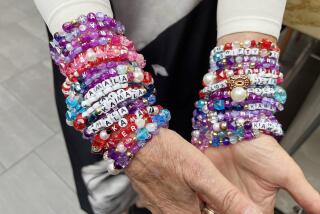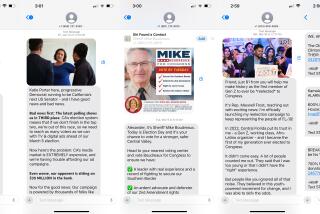Presidential pin money
The votes are in, and it’s bad news for John McCain. Barack Obama has a big lead in the sale of campaign buttons and other election paraphernalia, outselling McCain 3 to 1 on one memorabilia website.
An Obama victory could make some of those pieces more valuable, experts say, given the historic nature of his candidacy. A button from the launch of Obama’s presidential campaign sold for $150 in August at the American Political Items Collectors National Convention.
If you think there’s no redeeming value to the interminable exercise known as the American presidential campaign, you are not a collector. The stock market may have tanked, but the longest presidential season in U.S. history has stimulated a different kind of investment opportunity.
“This year more than any other, people are collecting political memorabilia,” says Adam Gottlieb, a spokesman for the California Energy Commission and a presidential-item junkie whose extensive Teddy Roosevelt collection is on exhibit through the end of the year at the California Historical Society in San Francisco. “People are yearning for nostalgia, something meaningful in their lives.”
On Monday, the PBS series “Antiques Roadshow” gets into the act with “Politically Collect,” a program that pulls back the appraisal curtain on presidential artifacts worth considerably more than the paper or tin on which they’re printed -- up to $75,000, for instance, for a photograph of Lyndon B. Johnson taking the oath of office after President Kennedy was shot in 1963.
“Political items have really gone up in price,” says Jeffery Daar, an attorney and Democratic Party activist whose Northridge home overflows with buttons and other memorabilia from the last 40 years of electioneering.
Presidential paraphernalia has long been the domain of hard-core political fans such as Daar, who live to unearth an obscure invitation or rare tchotchke. But in the last decade, the field has also become a place to make a tidy profit. A 1920 button of Democratic presidential candidate James Cox and his running mate, Franklin Delano Roosevelt, can sell for as much as $30,000. Last month, a signed photo of John F. Kennedy was going for $4,200 on Politics-Now.com. EBay and political memorabilia auction sites have made it possible for anyone to click their way into the game.
The collecting impulse is driven by something the afflicted say you can’t get from stamps or Cabbage Patch stockpiles.
“It’s not just a button, but an item in a political campaign. It’s a piece of living history,” says Daar, former head of the Democratic Party in the San Fernando Valley and a longtime delegate to his party’s conventions, where he scoops up all the mementos he can.
“Every collector of political memorabilia is also a frustrated historian,” says Steve Ferber, who sells mementos of presidents and hopefuls with his wife, Lori, through LoriFerber.com.
Tom Morton, a Los Angeles accountant specializing in pre-1930s items, recently landed clay smoking pipes puffed by Millard Fillmore and Franklin Pierce.
“It’s one thing to read about it in a history book,” he says. “It’s quite another to hold it in your hands.”
But not all candidates inspire collectors to reach out and acquire. Tom French, a leading dealer and owner of Politicalheritage.com in Santa Cruz, says it’s hard to give away a Nixon button. It’s also tough unloading Michael Dukakis, Bob Dole and George W. Bush fare.
Not surprisingly, the most in-demand figures tend to be the most charismatic and popular presidents -- Abraham Lincoln, FDR and Theodore Roosevelt, JFK, Ronald Reagan. Harry Truman also vaults into the ranks of the most valuable because scant artifacts were produced for the candidate who was a long shot to win in 1948.
Scarcity, popularity and age are major factors in the pricing of political memorabilia. An abundance of items were produced for 1940 Republican candidate Wendell Wilkie, including some fabulous Wilkie nylons ($40) and buttons that said, “No Man Is Good Three Times,” all to no avail against the popular FDR. So many Wilkie items are in circulation, they’re cheap -- not like the Cox-FDR button, valued at $30,000 because only a few dozen are known to exist. Some scarce Truman items can run about $10,000.
For collectors, a crucial consideration is whether the material was produced by the campaign. Daar says 95% of the buttons and T-shirts available for sale in the current cycle were made by outside vendors and won’t be worth much. Look for official items created by the Obama and McCain campaigns and materials with specific dates and events attached to them, such as an Obama button from the rural caucus, something Daar likes for future value.
Collectors recommend buying things you like -- favorite candidates or graphics that catch your eye. And if you want to buy for investment, do the research to make sure the item is authentic. You can get help by joining American Political Items Collectors ($28 a year, www.apic.us), a national organization founded in 1945 that sponsors dozens of button meets every year and authenticates artifacts.
Avid collectors, however, are drawn to the outsized characters who seek the highest office in the land and the creative wiles used to get them there.
“There’s got to be something behind the item -- the personality, the election, the historical context, or you might as well be collecting nails,” says Neal Machander, an Orange County collector and past president of American Political Items Collectors.
The exploits of rough-riding, big-game-hunting Teddy Roosevelt have captivated Gottlieb since he was in grade school. “It’s like he lived six lives,” Gottlieb says.
His collection contains mementos of Roosevelt’s whistle stop in Los Angeles on his trip through California in 1903. When it comes to straight talk, it’s hard to top this line from a Roosevelt button in 1912: “If You’re Against Me, You’re a Crook.”
The sedate catch phrases of modern elections are as exciting as a phone book next to the raucous sloganeering of the early 20th century. Take, for instance, the 1928 rallying cry on an anti-prohibition button: “Vote for Al Smith and Make All Your Wet Dreams Come True.” Last year, it sold at auction for $9,560.
“Collectors really eat up the hoopla,” says French, who adds that he’d kill on “Jeopardy” in the VP category. “It’s an important representation of what democracy and politics are all about. We’re just in awe of the office.”
--
More to Read
Get the L.A. Times Politics newsletter
Deeply reported insights into legislation, politics and policy from Sacramento, Washington and beyond. In your inbox three times per week.
You may occasionally receive promotional content from the Los Angeles Times.










